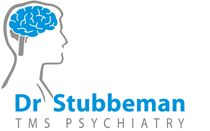
Category Archives: Research


Repetitive Transcranial Magnetic Stimulation as an Augmentative Strategy for Treatment-resistant Depression
Background Dozens of randomized controlled trials (RCTs) and meta-analyses have demonstrated the efficacy of repetitive transcranial magnetic stimulation (rTMS) for major depressive disorder (MDD) treatment, but there has not been a meta-analysis report which evaluates the efficacy and tolerability of rTMS used as an augmentative strategy for antidepressants in treatment-resistant depression (TRD) treatment.
Intermittent Theta-Burst Stimulation of the Lateral Cerebellum Increases Functional Connectivity of the Default Network
In humans, we applied theta-burst transcranial magnetic stimulation, guided by subject-specific connectivity, to regions of the cerebellum to evaluate the functional relevance of connections between cerebellar and cerebral cortical nodes in different networks.
The Neuropsychiatry of Tinnitus: A Circuit-Based Approach to the Causes and Treatments Available
Patients presenting with tinnitus commonly have neuropsychiatric symptoms with which physicians need to be familiar. We provide an overview of tinnitus, including its types and pathophysiology.
rTMS Induced Tinnitus Relief Is Related to an Increase in Auditory Cortical Alpha Activity
Chronic tinnitus, the continuous perception of a phantom sound, is a highly prevalent audiological symptom. A promising approach for the treatment of tinnitus is repetitive transcranial magnetic stimulation (rTMS) as this directly affects tinnitus-related brain activity. Several studies indeed show tinnitus relief after rTMS, however effects are moderate and vary strongly across patients.
Recent Advances in Stroke Recovery and Rehabilitation
Several methods, including bedside motor assessment, electrophysiological assessment (by transcranial magnetic stimulation [TMS] to induce motor evoked potential on the unaffected limb), and advanced imaging tools (functional magnetic resonance imaging [MRI] to detect the brain activation pattern) were all found to have some predictive value for motor impairment.
A Journey of Tinnitus
Tinnitus is one of the most common neurological symptoms. Approximately, one-third adults experience it once in their life time, 10% of them experience prolonged tinnitus and 5% suffer from severely disturbing tinnitus.
TMS Improves Memory via Brain Surface Networks
Repetitive transcranial magnetic stimulation (rTMS) improves memory by activating a network of surface brain regions that interact with the much deeper center of memory, the hippocampus, a new study suggests.
Response to TMS Sustained in Depression
The final analysis of a study evaluating transcranial magnetic stimulation (TMS) confirms that the majority of patients with resistant depression who respond to TMS in the acute setting continue to have a sustained response for a period of 1 year, an observational trial shows.
